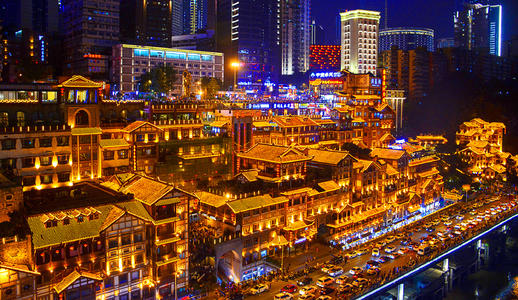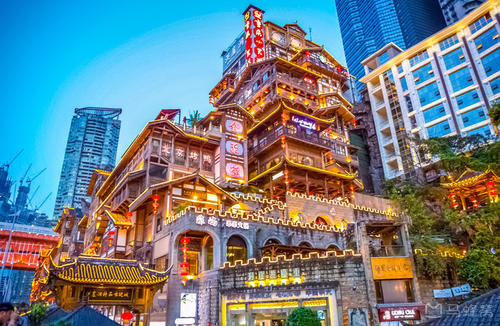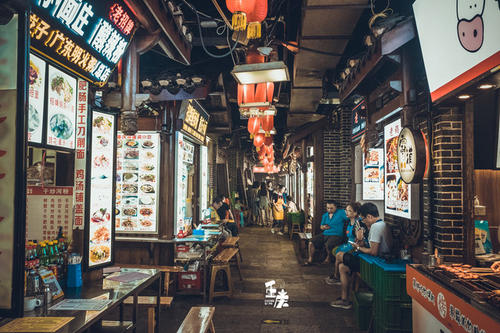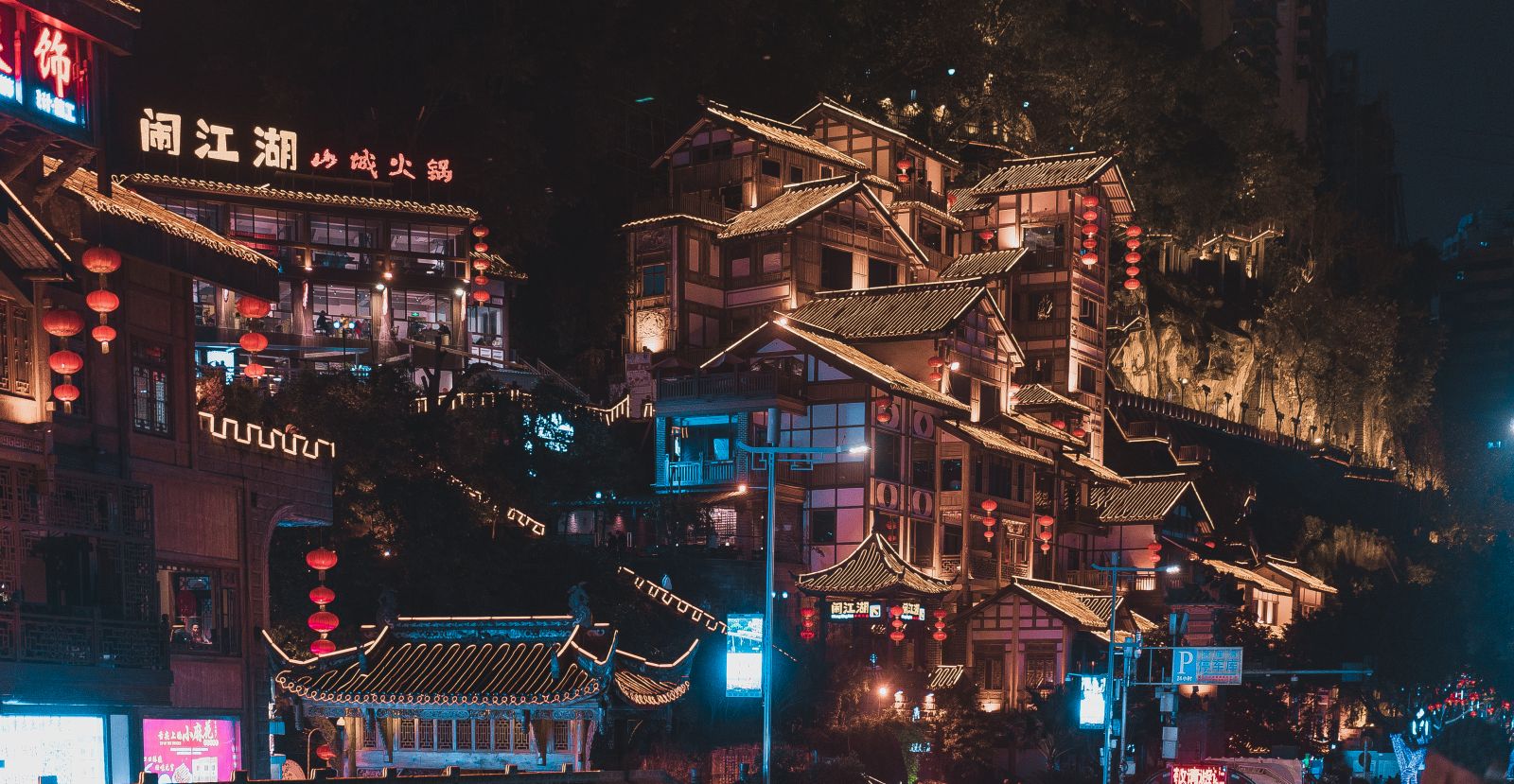Chinese Name: 洪崖洞 Pronunciation: Hóngyá Dòng
Suggested Visiting Hours: 2-4 Hours
Function: Commercial Center
Best Visiting Time: All year round
Address: Cangbai Road, Yuzhong District, Chongqing City, China
Popular Activities: Sightseeing, taking photos, tasting delicious food, shopping, and experiencing Bayu culture

Hongya Cave, a comprehensive tourist area for sightseeing, leisure, and vacation, is located in the riverside area where the Yangtze River and Jialing River converge. Stretching about 600 meters along the Jialing River and covering a building area of 46,000 square meters, Hongya Cave is a group of stilted houses built on a steep cliff featuring the traditional architectural style of Bayu area (old names of Chongqing in ancient times).
The 11-story building of Hongya Cave integrates six industries including catering, entertainment, leisure, health care, hotel, and shopping, becoming a unique three-dimensional aerial pedestrian street and commercial center in Chongqing City. Hongya Cave is a key landscape project manifesting the diverse culture and profound history of Bayu area, and hence it was announced as a national AAAA-level tourist attraction by the Ministry of Culture and Tourism of China.

Hongya Cave, formerly known as Hongya Gate, was one of the city gates of ancient Chongqing. In 1371, the fourth year of the Hongwu period of the Ming Dynasty, a general called Dai Ding built 17 city gates with 9 of them being opened gates and eight of them being closed gates. As one of the closed gates, Hongya Gate was a fake gate with towers and forts but could not be opened, and hence it was used to create an illusion that the city was equipped with a strong defense system rather than to ease access for the ordinary people.
It is said that in the cave on the cliff outside Hongya Gate lived an immortal called Hongya, and therefore Hongya Gate was later renamed Hongya Cave (Hongya Dong). Hongya Cave was once occupied by beggars and porters, and they built a stilted house on the edge of the cliff with simple materials and crude design. As time went by, the building seemed to be incongruous in this increasingly modern city, and therefore, in 2006, Chongqing Little Swan Group invested nearly 400 million yuan to restore it into an antique commercial street with a distinctive style of the traditional stilted house in Chongqing City.
Located on the fourth floor of Hongya Cave, Feast Food Street is 100 meters long and seven to eight steps wide. The street, which is paved with bluestone slabs, is a place where famous Chinese and foreign restaurants are concentrated. Some artisans make snacks such as sticky rice cakes, baked peanut candy on-site on Feast Food Street.
Dandan Noodles, Big Tangyuan (a ball of glutinous rice flour), Gele Mountain Spicy Chicken, Qianjiang Chicken Offal, Chongqing Maoxuewang (duck’s blood, beef, and tripe in spicy soup) are some of the recommended local food in Hongya Cave.
Some recommended specialties in Hongya Cave include concentrated hot pot seasoning, crispy chili, Hechuan Walnut Slice, Light Shadow Beef (sliced tendon meat of bull’s hind leg that is made through processes such as marinating, drying, baking, steaming, and frying), etc. Besides, there are many souvenirs such as antiques, paintings, calligraphy, jewelry, jades, etc. on the 1st to 3rd floors.

The Dynamic Bar Street is located on the 5th floor of Hongya Cave, where there are global chain bars from more than 30 countries and regions such as Japan, Korea, Italy, Turkey, etc.
Located on the 9th-10th floors of Hongya Cave, Exotic Street is an ideal place for visitors to experience exotic culture and enjoy varieties of food from all over the world. Besides, there are also some cafes where one can appreciate the beautiful views of the Jialing River.

Covering a total area of about 3,100 square meters, 1980s Street was designed to restore the scenes of people’s daily life in Chongqing in the 1980s and 1990s, including Tram No. 5, Shancheng Cinema, Disco Square, etc. The street is divided into different areas such as the life scene area, performance area, interactive experience area, and so on. Apart from that, Teresa Teng Holographic MR Interactive Music Show could also be seen in the Shancheng Cinema.
Hongya Cave was once a verdant forest, and the clear water, flowing along Dayang Ditch and Huixian Bridge, converged and formed a small stream flowing to the vicinity of Hongya Cave. In the season with little rain, the water dropped down from the cliff and was reflected by the sunlight, all of which were like green beads and jasper, and hence it was called “Hong Ya Di Cui” by literati and poets, eulogizing the beautiful scene of the green bead-like water dropping down from Hongya Cave.
Hongya Cave is free of charge and paper tickets are not needed. It is necessary to reserve tickets online in advance for the number of visitors. Hongya Cave restricts population of entry during holidays.
The night view of Hongya Cave is a highlight and the lights of Hongya Cave turn on at 18:00 and turn off at 22:00. One could enter or leave Hongya Cave on the 1st or 11th floor.
Take Bus No. 480, 553, T002, or T040, get off at Jiabin Road Hongya Cave Station, and then walk about 200 meters to get to Hongya Cave.
Take Bus No. 346, 476, 0491, or 0492, get off at Xiaoshizi Xiaoshangpin Station, and then walk about 420 meters to get to Hongya Cave.
Take Bus No. 105, 111, 114, or 135, get off at Xiaoshizi Station, and then walk about 240 meters to get to Hongya Cave.
Take Bus No. 462, 465, High-Speed-Railway Shuttle Bus G01, get off at Jiefangbei Station, and then walk about 480 meters to get to Hongya Cave.
Take Metro Line 2, get off at Linjiangmen Station, and get out from Exit D.
Take Metro Line 1 or 6, get off at Xiaoshizi Station, and get out from Exit 9.
Chinese: 请带我去洪崖洞。English: Please take me to Hongya Cave.
| Departure | Destination | Fare | Time |
| Chongqing Railway Station | Hongya Cave | Around 16 yuan | Around 15 minutes |
| Chongqing North Railway Station | Around 25 yuan | Around 30 minutes | |
| Chongqing South Railway Station | Around 35 yuan | Around 30 minutes | |
| Chongqing West Railway Station | Around 50 yuan | Around 40 minutes | |
| Chongqing Jiangbei International Airport | Around 65 yuan | Around 40 minutes |
